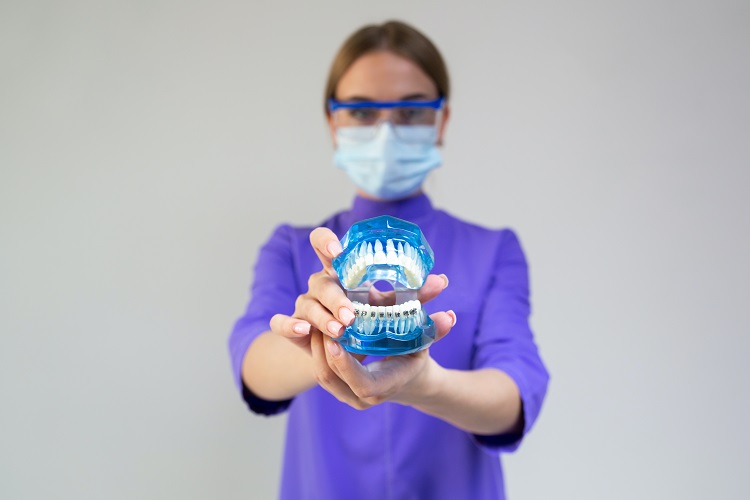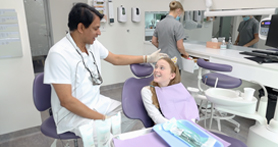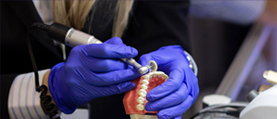Dental dentures are replacements for missing teeth and are available in two types, complete dentures and partial dentures. Complete dentures are placed after all the teeth are removed because of medical purposes or have fallen off naturally on their own. They cover the whole surface of the gums.
There are also immediate dentures that are attached to the mouth right after teeth are removed or have fallen off. However, the gums have to heal after tooth removal, so a change in shape and size is expected. In such cases, the immediate dentures may not be very beneficial as they will be misaligned due to changes in the shape of gum tissue. That is why immediate dentures are used as a temporary fix for missing teeth until conventional dentures are being prepared.
Partial dentures are placed in the mouth when there are still one or two teeth left. They consist of replacement teeth fixed with an artificial gum-like base with metal frames that help hold the denture in place. A fixed bridge and crowns are used to cover up the natural remaining teeth from damage and link all the teeth to one another. Removable partial dentures are also available in the form of precision partial dentures.
Here is how the patient should take care of dentures and properly wear them:
1. Avoid sharp objects
Sharp objects like toothpicks, scrapers, etc. are used by many people to scrape off remaining food particles from the teeth and dentures. Regular scraping can cause scratching of the dentures and can damage them. Using toothpicks and scrapers can also damage the gum tissue. Therefore, it is highly recommended that you avoid putting any sharp or hard objects into your mouth while wearing dentures.
2. Avoid certain foods
Foods with hard shells like popcorn, nuts or frozen chocolates, etc. should be avoided since chewing them creates pressure on the dentures and they may become brittle. Popcorn and other foods can also get stuck in between the dentures and can quickly allow bacterial growth.
Certain beverages like coffee and tea should also be avoided. When consumed in excess, these beverages can permanently stain both the natural teeth and dentures. However, moderate consumption has no harmful effects. Crunchy foods like crisps and crackers should also not be eaten in excess. They can get stuck in-between dentures and teeth and can cause pain.
3. Brush dentures daily
Just like natural teeth, dentures also require thorough cleaning. The patient can clean the dentures with the help of normal brushing with denture cleaning solutions and a toothbrush. However, the dentures must be bushed very gently or they may be damaged. Brushing dentures once a day is recommended for maintaining them. It is advised to take them out of the mouth and place them on a tabletop and brush them gently for 4-5 minutes. Rub the area gently so that any remaining food particles are also removed.
Also, if the patient removes the dentures before bedtime, they are advised to wash the dentures with clean water before wearing them again.
4. Remove them before bed
It is recommended to remove the dentures before bedtime and soak them in a specialized denture cleaning solution. If the solution is not available, warm water can also be used.
If not before bedtime, they must be removed for 6 hours for any other time of the day. This is recommended to ensure the mouth doesn’t feel sore due to wearing them. Also, removing them for a few hours ensures that the mouth and gum tissue can heal and recover on its own. And as stated previously, it is extremely important to wash the dentures with water before wearing them. Because, if the dentures are soaked in a dental cleaning solution, chances are that the patient may consume it unintentionally. Intake of such products can cause irritation, inflammation, and even burns. To avoid such painful conditions, dentures must be rinsed thoroughly before wearing.
5. Regular dental visits
Although very commonly suggested, very few patients take dental visits seriously. It is recommended to visit the dentist once or twice a year. It not only ensures dental and oral health but also ensures that the dentures remain in usable conditions. As the dentist will check and examine the ventures for any signs of damage and will also inform the patient if the set of dentures has expired and it is time to change them with a new one.
Also, the patient can always let the dentist know for any discomfort or irritation caused by dentures and can ask for advice on how to maintain and care for dentures. The dentist may also recommend the patient products for taking care of these dentures.
6. Do not use bleaching agents
Bleaching agents like hydrogen peroxide can damage dentures as well as teeth. It is usually used in whitening treatments available in the market for at-home whitening. Using such products can weaken the dentures and can alter their colour. Also, some bleaching products contain chlorine which can corrode the metal parts present in the dentures.
Usually, if the whitening agent is very mild, the denture will not respond to it, but if it is in concentrated form, it may potentially damage them.
7. Avoid hot water
It is very common for patients to use hot water for cleaning dentures. It is a misconception that hot water can clean dentures better than normal water. It may clean the dentures but it may melt them or warp them causing their structure to be destroyed and making them unsuitable for usage. Dentures may also shrink and decrease in size when placed in high-temperature liquids. Since their structure is derived from acrylic material, placing them in boiling water will permanently damage them. Sometimes the damage could be so severe that the dentures may be needed to be replaced by a new set. A better alternative for cleaning and sterilizing dentures may be a deep-cleaning denture solution. The patient will observe a new sheen to the dentures once it is used regularly.




